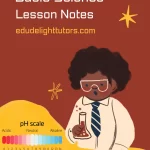Tag: Basic Science Primary 5 Second Term Lesson Notes
Explore simplified answers to common questions about basic science for Grade 5 students. Learn about soil, plant growth, types of soil, technology, measurement, and more in this easy-to-understand guide.
Answer The Following Questions: What is soil? Mention two types of soil. What is growth? List two conditions that affect plant’s growth. What soil is good for modeling? What soil is good for building bridges and houses? What soil is best for agricultural practice like planting of crops? What is change? Mention two types of…

Plant Growth Basic Science Primary 5 Second Term Lesson Notes Week 3
Lesson Plan Presentation Subject: Basic Science Class: Primary 5 Term: Second Week: 3 Topic: Growth of Plants Sub-topic: Stages of Plant Growth Duration: 45 minutes Entry Behaviour: Discuss the types of soil learned in the previous class. Ask students to recall what plants need to grow. Key Words: Seed, Germination, Seedling, Mature Plant, Flowers, Fruits.…

Second Term Revision and Readiness Test Basic Science Primary 5 Second Term Lesson Notes Week 1
What is the transformation from one form to another known as? List four objects that can be found in our home environment. Write out two ways of cleaning our environment. Define erosion. Mention any two types of erosion. Mention two causes of erosion. Write out two effects of erosion. List two types of pollution.…